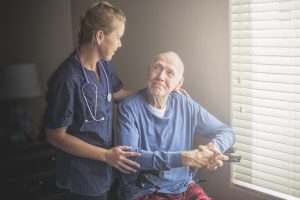Signs That Hospice Care Is Necessary for Your Loved One

Accepting the process of aging might be challenging at times. Even when our loved ones are in the latter stages of a devastating illness, there is still the possibility that medical therapies will extend their life. However, medicine can only go so far.
One of the most challenging choices you will ever face is determining whether or not an older family member or friend requires hospice care services. There is a good chance that the older person under your care will not express a desire to go into in-home senior care.
We have compiled a list of five warning signals that indicate hospice care may be necessary for your elderly loved ones to help you make your decision.
1. A Decline in Physical Function
As we age, our physical function generally declines. It is a normal part of aging, and it’s not a big deal for many of us. We may slow down a bit and need to take more breaks when doing physical activity.
For some elders, though, this decline in physical function can be a warning sign that hospice care is necessary. This care focuses on providing comfort and support to people who are terminally ill. It can be provided in a nursing home, hospital, or home.
If your elder is experiencing a decline in physical function, it’s essential to talk to their doctor. The doctor will be able to determine whether the decrease in physical function is due to a terminal illness and if hospice care is appropriate. If so, they will work with you and your elder to develop a plan of care that meets their needs.
2. Changes in Mental Status
Mental status changes can include confusion, delirium, dementia, and depression. These shifts are sometimes red flags indicating the need for hospice care. These changes can be sudden or gradual, and they can be mild or severe.
Hospice care can support the person with mental status changes and their caregivers. The team can help manage symptoms and provide emotional support.
3. Increasing Weakness
Older people experience weakness, but it is a normal part of aging. However, if your elderly loved one is experiencing increasing weakness, it could be a warning sign that hospice care is necessary.
Hospice care focuses on managing pain and other symptoms rather than trying to cure the underlying disease. It allows the patient to focus on enjoying the time they have left rather than on their illness.
4. Caregiver Is Experiencing a Lot of Anxiety and Fatigue
Many caregivers find themselves experiencing anxiety and fatigue as their elderly loved ones approach the end of their lives. It is perfectly natural, as caring for a dying loved one can be an emotionally and physically draining experience. However, if your caregiver finds that their anxiety and fatigue are becoming unmanageable, it may be a warning sign that hospice care is necessary.
Hospice care teams can help caregivers manage stress and fatigue and provide emotional support. In addition, it can help remove some of the burdens of caregivers by providing services such as respite care, which can give caregivers a much-needed break.
5. An Increasing Number of Trips to the Clinic or ER
If you have an elderly loved one who is making more trips to the doctor or the ER, it is essential to talk to their doctor about whether hospice care may be a good option. It can give them the support and care they need to live their final days with dignity and peace. If you are concerned that an elder in your life may need hospice care, talk to their doctor to learn more.
Conclusion
It is crucial to learn the warning signs that hospice care is necessary for elders for you to make the right decision. It will allow you to provide the best care for your loved one in their final days. It is essential to remember that it is a vital service that can provide comfort and peace to patients and their families.
Are you searching for hospice care in Morristown? Check out Morristown, HC! Our team of medical experts comes up with individualized treatment regimens for each patient. Our facility has a nurse practitioner, a respiratory therapist who works here full-time, a physician who is on-site at all times, and leading specialists who make regular rounds. Call us today for more information!